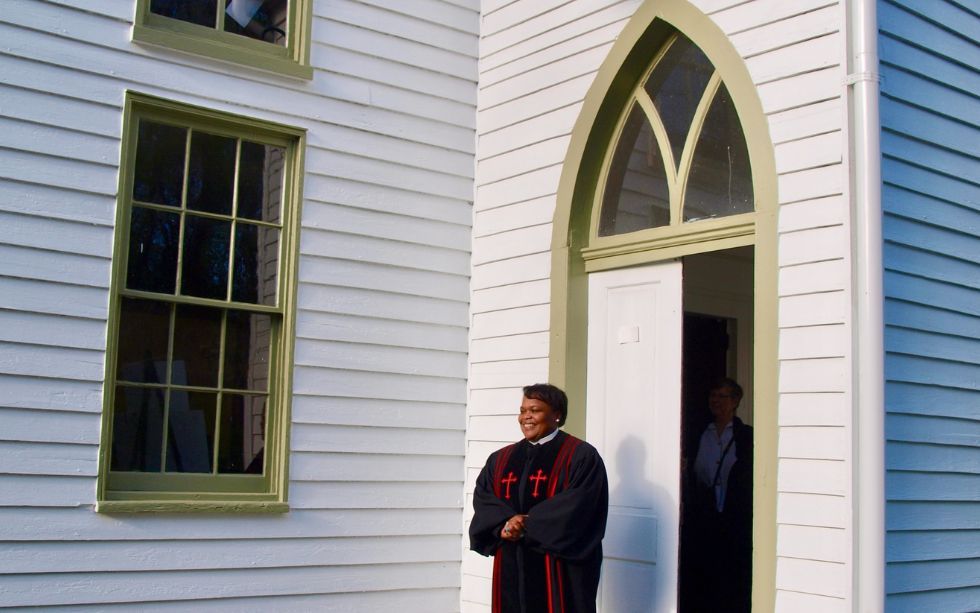Should I Go to a Church That Has a Woman Pastor?
Woman's leadership in the church can be a very controversial topic with much said and little discussed. There is a Biblical way to discuss and approach this topic in the church. Tina lays out examples from the Bible of woman's leadership.

“I am sorry, but I would never go to a church where a woman was the lead pastor.”
I stood there stunned that these words had just come out of someone’s mouth. A wave of silent anger and sadness washed over me as I let these stinging words pierce my heart. Because I didn’t think it was the right time to speak up, I chose to remain silent. Instead, I let my silence convey my feelings. It wasn’t the first time I’d had a conversation like this.
Listen, before I get into this, I’ll admit this is a hot topic in some circles. What does the Apostle Paul mean when he writes in Ephesians 5:23 that the husband is the “head of the wife?” While we won’t tackle this specific issue in this post, I do want to talk about women, and more specifically, female pastors. To be honest it’s a topic I wish I didn’t have to talk about but here I am writing this blog as a female and as a female pastor of a church.
In over thirty years of being a Christian and studying the Bible, I have noticed there is the way things ought to be and the way things are. We wish for a world of peace, but instead, there is conflict. We wish we didn’t have to die, but one day our physical bodies will give way. We wish for cancer to disappear, but sickness lingers. Why do we wish things were different? Because this life of fragility, sin, and evil is not what God wants for us and yet, we have to live in it because of sin. I believe this same logic is true about the topic of women and their role in the body of Christ. There is what is and the ways things ought to be.
This leads us back to whether or not women should preach. Does the Bible support women in leadership and female pastors? Here’s why I believe God calls women and they can lead or contribute to God’s work.
First, If women should not be leaders and involved in God’s work then there should be ZERO examples of women leaders doing God's work in the Bible.
But this is not the case. Repeatedly, we see different women throughout the Old Testament and New Testament doing the work of God. We can look at Deborah who led an army into battle (Judges 4-5). Then there was Esther, a queen to King Xerxes and vital in saving the Jewish people. Rahab was a prostitute and protected two spies sent by Joshua. Abigail diffused a conflict between David and her husband Nabal in 1 Samuel 25. Huldah was a prophetess who was the one who could give a word to God’s people in 2 Kings 22. Mary Magdalene followed God and called him “Teacher” when she realized her Lord had resurrected her (Luke 8). Lydia asked Paul to come to her house (Acts 16).
The list could continue. Over and over again we have examples of women leading and being involved in ministry.
Second, Jesus broke all the social norms in relation to women.
Jesus talked to the Samaritan woman at the well in John 4. Jesus went to Mary and Martha‘s house in Luke 10. Jesus allowed women like Mary Magdalene, Johanna, and Susanna to be part of his work and ministry. Jesus talked to women, encouraged them, healed them, and touched them. He did everything contrary to the social norms. Why? Because for Jesus women were humans. Women played an important role in the kingdom of God. Women were capable. If Jesus didn’t think women should have any place in society then why give them any attention and extend to them the opportunities he offered?
Third, the Apostle Paul encouraged and acknowledged women in ministry.
Paul mentions women like Phoebe, a deacon (Romans 16:1), Priscilla a co-worker in Christ (Romans 16:3), and many other female names in Romans 16.
Fourth, context, context, context.
Every passage in the Bible has a context. Some scriptures relate to a specific period of time, and they are not meant to be transferable to the 21st century. For example, when God gave instructions on the five sacrifices for worship in Leviticus these were intended for a specific time and generation. But today we don’t do those five sacrifices anymore because Jesus is the ultimate sacrifice and replaces that system of offerings. But for us to know this we need to read the entire Bible from front to back.
This leads us back to the New Testament where we have two incidences where it seems like Paul, who supports women doing God’s work, is no longer allowing women to be involved. These include 1 Corinthians 14:32-45 and 1 Timothy 2:12. Both of these passages have prompted some to say women are not trained or qualified to speak. So this begs the question, was Paul confused? I think not. Rather, we need to read these passages in context. Paul was not saying ALL women must not teach, lead, or preach. He was talking about THOSE women.
We have to learn the difference between what is cultural or contextual versus biblical. For example, the Bible says God expects a man to have one wife (Genesis 2: 24) but sometimes we see men of God who had more than one wife. We can mention David, Elkanah, and Solomon as examples. This is an example of what was culturally acceptable but not biblically correct. I would argue the same thing with women in ministry and leadership. Culturally it is looked down upon but is it biblically incorrect?
Based on the points above I would argue no. If we survey the entire Bible and see that God used women, allowed them to be part of ministry (specifically by Jesus and Paul), and make a difference in the kingdom of God, then those who oppose women who are leaders or pastors in a church are not accepting of what is evident in our Bibles. They are turning a blind eye. Think about it this way.? Either abortion is wrong or it’s right. Sex before marriage is wrong or it is right.? Lying is either wrong or right.? You get my drift. If women should not and cannot teach, speak, or lead, then Paul and Jesus were wrong because they allowed women to participate in God’s work.
So this raises another important question. Were Paul and Jesus confused or are we confused about this matter? Perhaps the real issue isn’t what the Bible says. Because I have shown you that God used women to spread his kingdom.
Maybe the reason some are so quick to oppose women as leaders and pastors in the church points to a deeper issue. Perhaps the real battle is combatting a subconscious spirit of control, power, or oppression.
It’s the same argument that we need to address when we talk about class or race discrimination. We know what the Bible says, which is to treat all people equally, but sometimes we would rather turn a blind eye and hold on to realized or unrealized biases because that is what we’ve been taught, what is familiar, and feeds our sinful nature. But our behaviors are not pleasing to God.
Here’s the truth: God is calling women to lead and to use their gifts to glorify God. We shouldn't be shunning them but rather embracing them and letting the Holy Spirit direct them to all they need to be.
At the end of the day, we are not talking about a woman who believes murder is right, abortion is acceptable, or lying is permissible AND wants to preach, teach and lead. We’re talking about a human who was born as a female and who feels this deep desire to serve God and believes that if she does not lead, teach, preach, or become a pastor she’s being disobedient to God.
And because of her courage not to listen to the people opposed to her, she is making a profound difference in the kingdom of Christ
Just think if Deborah did not lead Israel, if Esther didn’t speak up, if Abigail didn’t intervene, if Mary said no to God to bearing Jesus, if the Zeleophehad daughters didn’t ask for justice, if Johanna, Susanna, and Mary Magdalene didn’t follow Jesus, and Phoebe and Priscilla didn't work with Paul and teach and help where would we be today?
I am thankful for these women who were obedient to God even when their life was at stake and if you ask me they exemplify more of Christ than any argument about her role. Because just like Jesus who was obedient until death, so were they.
Look at it this way, women who feel called by God to do his work will not have to answer to the people but to God. Paul writes to the church about his ministry, “On the contrary, we speak as those approved by God to be entrusted with the gospel. We are not trying to please people but God, who tests our hearts.”1 Thessalonians 2:4 NIV. He's right, we are not trying to please people because when everything is said and done, we are here to please God and no one else.




Comments ()